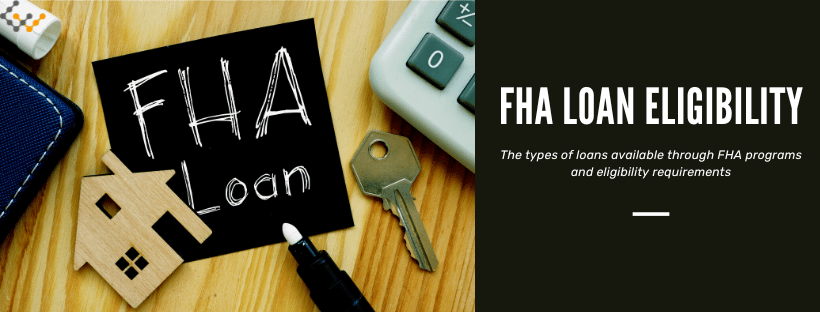FHA Loan Eligibility: FHA Loan Requirements Explained

What Is an FHA Loan?
An FHA loan is a type of government-based secured loan. It’s issued by the Federal Housing Administration (FHA). With this type of program, qualified borrowers can access a loan with potentially lower interest rates and with fewer restrictions. FHA loans are underwritten and administered by third-party lenders, though the federal government backs them.
Types of FHA Loans
To determine eligibility for FHA loan programs, it is first important to know the various types available:
- FHA 223(f) Loans
- FHA 223(a)(7) Loans
- FHA 221(d)(4) Loans
- FHA 241(a) Loans
- FHA 232 / 223(a)(7) Loans
- FHA 242 Loans
Here’s a breakdown of what each of these loans offers and some of the requirements.
FHA 223(f) Loans
FHA 223(f) loans are designed to help with the purchase and refinancing of existing multifamily rental housing units. These are properties that were originally financed through FHA insured loans or conventional loans. Properties that are eligible for this type of loan typically have at least 5 residential units with full kitchens and bathrooms in each. These are not loans for major renovations but rather for those in good condition overall.
Borrowers can be either for profit or nonprofit organizations. There’s no limit to who can occupy this type of residential property.
FHA 223(a)(7) Loans
FHA 223(a)(7) loans allow for the refinancing of certain types of FHA and HUD held loans. These are properties that are subject to the Multifamily Assisted Housing Reform and Affordability Act (MAHRA).
This type of loan helps to protect lenders against losses on defaults on mortgages. To do that, this section of HUD’s program allows for the extension of loan terms by up to 12 years beyond the current maturity date of the loan. It is not possible to extend these loans more than 75 percent of the remaining useful life of the project.
This type of refinancing usually helps to reduce the debt service on the loan and helps to improve cash flow for the lender. That comes from lowering the current interest rate and extending the amortization period.
This type of loan is available on for profit and nonprofit borrowers for all types of customers and tenant properties. It is only available on MAHRA loans.
Answer a few questions and get custom mortgage quotes. We'll match you with offers from our network of 650+ lenders.
FHA 221(d)(4) Loans
FHA 221(d)(4) helps to ensure some types of new construction or significant rehabilitation on multifamily rental properties, including cooperative living housing for moderate-income families as well as for handicapped and elderly tenants. Properties that fall under Single Room Occupancy (SRO) properties also qualify for this type of insurance under HUD.
The goal of this type of insurance on multifamily homes is to help reduce the risk of mortgage defaults. To do that, FHA 221(d)(4) loans help to provide assistance to private industry for the rehabilitation of the construction of rental properties for these individuals. It helps by providing more access to capital that is readily available.
To provide this support, FHA 221(d)(4) allows for mortgages of up to 40 years. These may be financed using Government National Mortgage Association (GNMA) mortgage backed securities.
These mortgages must be used for the construction or rehabilitation of semidetached, detached, walkup, row, or elevator-type rental property, as well as cooperating housing containing at least five units. Some restrictions may apply to property type. Borrowers can be public or profit-motivated sponsors as well as nonprofit cooperatives, investor-sponsor, general mortgagors, and limited distribution businesses. There are no income limits on these properties, and properties can be designed specifically for individuals who are elderly or handicapped, but that does not have to be the case.
FHA 241(a) Loans
Section FHA 241(a) under HUD laws provides for insurance on mortgage loans designed specifically to fund property improvements, significant repairs, and additions to multifamily rental housing. It is also available to be used on health care facilities. It specifically provides coverage to FHA insured first mortgages and HUD-held properties.
It helps to reduce mortgage defaults by helping to ensure projects are competitive and, in many cases, to extend the life of the property. In addition, these funds may be used to help replace equipment.
FHA 241(a) can help group practice facilities, multifamily homes, nursing homes, hospitals, and other types of real estate. It can be used to cover movable equipment in some types of healthcare facilities as well.
Additions and improvements to the property must be on HUD/FHA insured properties. The projects can also be to help finance energy conservation improvements on those properties. The maximum insurable loan cannot be more than 90 percent of the value of the addition. And that amount cannot exceed the insurable amount under the program.
FHA 232 / 223 (a)(7) Loans
FHA 232 / 223 (a)(7) refinancing is typically designed for the refinancing of loans for senior living, skilled nursing facilities, or assisted living. For those that purchased these types of properties through HUD 232 loans or HUD 323/233(f) loans, it may be possible to refinance under this section.
The amortization on these loans can be extended for a total length of 40 years. The loans are allowed up to 100 percent of the eligible transaction cost. That could include any existing debt, prepayment penalties, and funding that is necessary to replace reserves. It can also include capital needs assessment costs.
In total, the increase on these loans can be no longer than 12 years. The process is streamlined and efficient, and the loans are fully assumable.
FHA 242 Loans
FHA 242 Loans is a type of mortgage insurance for hospitals. It is administered by the Office of Hospital Facilities (OHF). It can be used for those building or purchasing hospitals, acute care hospitals, hospitals within systems, critical access hospitals, urban teaching hospitals, and all for-profit, not-for-profit, and government owned hospitals in any of the 50 states.
The funds from these loans can be used to expand, remodel, acquire, refinance, or modernize properties, including through the use of equipment purchases. There is no maximum loan amount for this purchase, with the loan-to-value ratio being up to 90 percent.
FHA will insure 99 percent of the loan amount. There’s also no cash required from the borrower at the time of the closing. It can help with lowering interest rates for borrowers.
Keep the Following in Mind
Eligibility for FHA loan programs is dependent on the specific terms and conditions set under HUD or law. Properties eligible for FHA loans are also set by those rules. This can change significantly between each of these sections of FHA loans.
When determining who is eligible for FHA loans, consider:
- The type of property required under the loan program
- The type of borrower eligible for the property loan
- The type of customer or rental tenant in that space
What are Requirements for a FHA loans?
In each of these situations, there may be property requirements based on the size and function of the property, borrower requirements. This could be such as the type of entity applying for the loan, and requirements based on the location or condition of the property. Most loans have minimum and maximum borrowing limits as well. Learn what the specific rules are for any loan program to determine which fits a specific need or goal.

